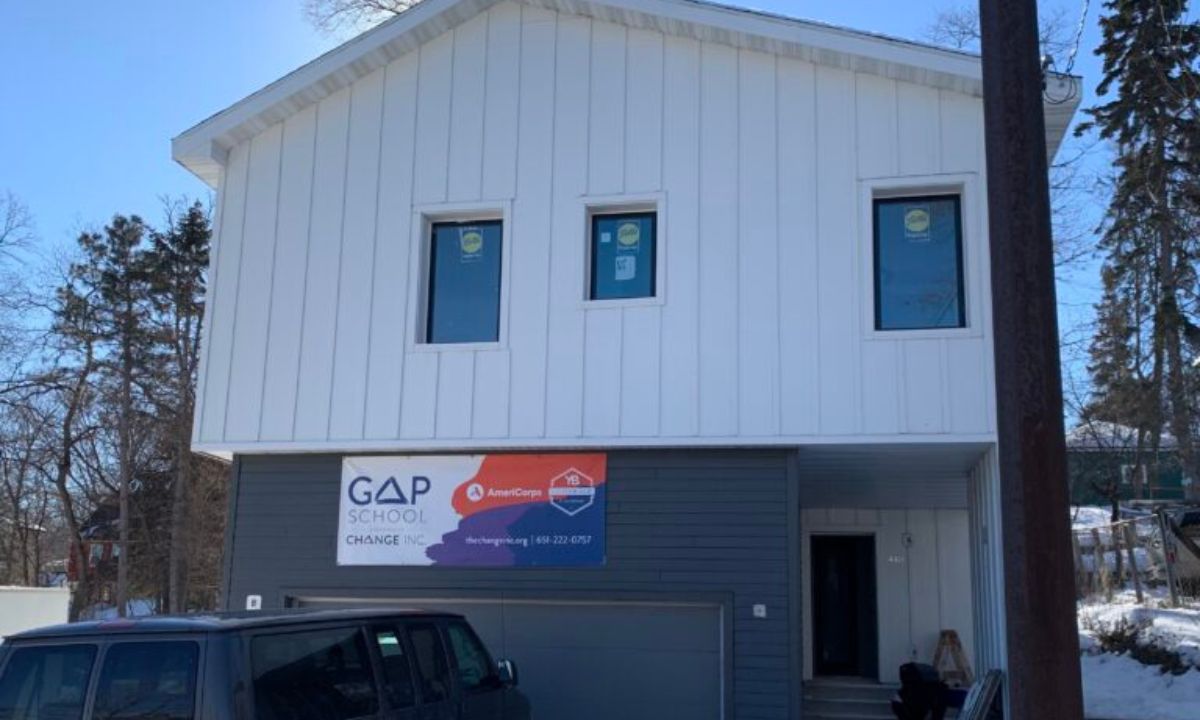St. Paul Students Learn Construction Skills Building Homes for Low-Income People
Rogers & Nathan: Program teaches HS students marketable skills while addressing construction worker shortage & a pervasive lack of affordable housing.

Get stories like this delivered straight to your inbox. Sign up for The 74 Newsletter
This year, with strong bipartisan support, Minnesota legislators passed a pair of bills that they call triple win legislation. The new laws address three critical issues: the need to ensure that public high school students graduate with marketable skills, the shortage of certified construction workers and a pervasive lack of affordable housing. The laws build on several examples of Minnesota public schools and programs that teach students construction skills as they build homes for low-income people and those experiencing homelessness.
Minnesota’s forward-thinking initiative was the subject of a Dec. 5 Reinventing America’s Schools webinar, co-sponsored by The 74, Progressive Policy Institute and Minnesota’s Center for School Change.
The successful passage of these laws provides funding to replicate programs like the one at GAP School, an alternative public school in St. Paul serving students aged 16 to 24. The school’s director, Jody Nelson, participated in the webinar, which was co-created by PPI’s Taylor Maag and Tressa Pankovits.
Nelson explained that GAP’s construction program:
- Enables students to learn marketable construction skills, giving them a head start on a well-paying career
- Produces homes that help to meet Minnesota’s need for affordable, permanent housing
- Helps to provide workers for construction and related fields, which are encountering significant shortages
“Our students have renovated four houses and built two new homes,” Nelson reports. Another is in the works, and the school has plans to do more. “Lots of our students are immigrants and refugees. This is a great way into high-wage, high-demand jobs.”
The school’s construction career pathway has been affiliated for years with the national YouthBuild USA, as well as Minnesota’s own YouthBuild program. GAP also recently won a national impact award from the U.S. Green Building Council.
GAP alumnus Hser Pwe was born in Burma and grew up in a refugee camp in Thailand after his family fled murderous Burmese soldiers. This year, he testified before the state legislature that the YouthBuild program at GAP not only taught him construction skills, but helped him improve his English and realize that he really did have opportunities. When he graduated in 2014, GAP helped him find a job installing floor covering. Eight years later, he has been promoted to foreman. He loves his career and makes more than $44 per hour.
Pwe told lawmakers, “Because of this program, I can speak English and support my wife and children. I have even become a U.S. citizen. Without YouthBuild, I do not know where I would be today.”
Khalique Rogers, co-director of Minnesota’s Center for School Change, helped lead the legislative effort, and with good reason. Rogers, who also is featured in the webinar, personally experienced homelessness.
After moving from Chicago from Minneapolis for what they hoped would be a better life, the Rogers family found their resources were soon exhausted by hotel bills and by landlords who demanded bogus rental application fees. The family was forced to sleep in their car. Finally, they found a shelter, but it would accommodate only his mother and siblings. His father wasn’t allowed to stay. Rogers recalls being in kindergarten and not knowing how to respond when a teacher asked students to draw a picture of their home. He described the experience as “dehumanizing.”
He has documented similar experiences of more than 30 young people, in collaboration with the nonprofit organization Youthprise, and Rogers shared his findings with MinnPost and Minnesota Public Radio. As he testified before the Minnesota legislature in 2021, “Many students find shelters to be dangerous places — we need to provide permanent housing options.” In part because of those efforts and youth activism, Minnesota legislators allocated $20 million per year over the next six years to help produce more permanent affordable housing.
In December 2022, Rogers and Joe Nathan convened 40 advocates, including Minnesota House Member Matt Norris, educators, city, county and state officials, lobbyists for people experiencing homelessness and 12 students already learning construction skills and building homes, to discuss possible legislation for 2023.
Based on these conversations, the Center for School Change led a coalition that produced the two laws during the 2023 legislative session. Lawmakers doubled funding for Youthbuild, a program that helps at-risk young people earn a high school diploma while developing marketable construction skills and knowledge. They also modified another state program to allow public schools, for the first time, to apply for up to $100,000 from a pool of more than $40 million to help construct permanent affordable housing. The success of schools with home-building career pathways convinced legislators to scale up these programs.
To help public schools seek this funding, the center has produced four free case studies of school home-building initiatives. These include GAP and a collaboration between GAP and Good Will/Easter Seals Minnesota that is constructing housing for low-income veterans and those who are experiencing homelessness. Two other brief reports describe schools where students are building tiny homes: Exploration Charter High School and Hutchinson High School. Additional case studies are being prepared.
Educators and policymakers in other states also may find these brief reports useful.
Minnesota Democratic State Rep. Matt Norris, lead sponsor of HF 1310 and HF 2492 in the Minnesota House, was also on the Dec. 5 webinar’s panel. Norris calls these bills “win-win-win.” That’s because the programs efficiently help meet needs for strong career preparation, more workers and affordable housing.
Get stories like these delivered straight to your inbox. Sign up for The 74 Newsletter

;)

